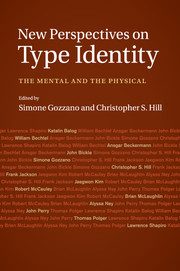
-
Select format
-
- Publisher:
- Cambridge University Press
- Publication date:
- April 2012
- March 2012
- ISBN:
- 9780511687068
- 9781107000148
- 9781107515420
- Dimensions:
- (228 x 152 mm)
- Weight & Pages:
- 0.62kg, 304 Pages
- Dimensions:
- (229 x 152 mm)
- Weight & Pages:
- 0.45kg, 306 Pages
- Subjects:
- Philosophy of Mind and Language, Philosophy
You may already have access via personal or institutional login- Subjects:
- Philosophy of Mind and Language, Philosophy
Book description
The type identity theory, according to which types of mental state are identical to types of physical state, fell out of favour for some years but is now being considered with renewed interest. Many philosophers are critically re-examining the arguments which were marshalled against it, finding in the type identity theory both resources to strengthen a comprehensive, physicalistic metaphysics and a useful tool in understanding the relationship between developments in psychology and new results in neuroscience. This volume brings together leading philosophers of mind, whose essays challenge in new ways the standard objections to type identity theory, such as the multiple realizability objection and the modal argument. Other essays show how cognitive science and neuroscience are lending new support to type identity theory and still others provide, extend and improve traditional arguments concerning the theory's explanatory power.
Reviews
"...provides perspectives on the type-identity thesis that are both philosophically acute and informed by recent findings in the neurosciences. In addition, many of the contributions provide insightful historical accounts of the fortunes of the type-identity thesis -- and indeed, more generally, of physicalistic accounts of the mind. Thus the essays in this anthology are not merely individually interesting, and well worth reading on their own, but the volume as a whole hangs together in a way that is unusually instructive, and would be an excellent and provocative choice for a graduate seminar in the philosophy of mind."
--Janet Levin, University of Southern California, Notre Dame Philosophical Reviews
Contents
Metrics
Altmetric attention score
Full text views
Full text views help Loading metrics...
Loading metrics...
* Views captured on Cambridge Core between #date#. This data will be updated every 24 hours.
Usage data cannot currently be displayed.
Accessibility standard: Unknown
Why this information is here
This section outlines the accessibility features of this content - including support for screen readers, full keyboard navigation and high-contrast display options. This may not be relevant for you.
Accessibility Information
Accessibility compliance for the PDF of this book is currently unknown and may be updated in the future.


